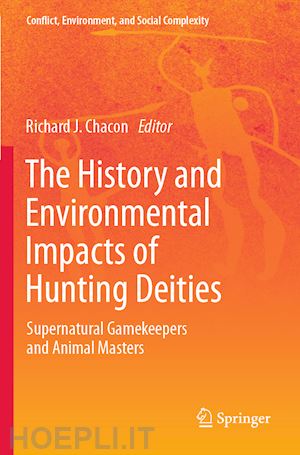

Questo prodotto usufruisce delle SPEDIZIONI GRATIS
selezionando l'opzione Corriere Veloce in fase di ordine.
Pagabile anche con Carta della cultura giovani e del merito, 18App Bonus Cultura e Carta del Docente
This edited volume analyzes the belief in supernatural gamekeepers and/or animal masters of wildlife from a cross-cultural perspective. It documents the antiquity and widespread occurrence of the belief in supernatural gamekeepers at the global level. This interdisciplinary volume documents both the antiquity and the widespread geographical distribution of this belief along with surveying the various manifestations of this cosmology by way of studies from Europe, Asia, Africa, and North and South America. Some chapters explore the manifestations of this belief as they appear in petroglyphs/pictographs and other forms of material culture. Others focus on the environmental impacts of these beliefs/rituals and prescribed foraging restrictions by analyzing how they affect game harvests. The internationally recognized scholars in this volume assess the efficacy of this particular form of traditional ecological knowledge (TEK) and investigate if adherence to the belief in animal masters actually causes hunters to refrain from overharvesting wild game and thereby contributes to sustainable hunting practices.
This volume is of interest to anthropologists, archaeologists and other social scientists researching traditional ecological knowledge (TEK), indigenous conservation, biodiversity, and sustainability practices, and animal deities.
Richard J. Chacon is Professor of Anthropology at Winthrop University, USA. He conducts anthropological research throughout the Americas. He has documented the subsistence patterns and belief systems of the Yanomamö of Venezuela, the Yora of Peru, and the Achuar (Shiwiar) of Ecuador. Additionally, he has investigated the traditional belief patterns of the Kuna of Panama. He has studied ritual violence among the Otavalo and Cotacachi Indians of Highland Ecuador. He documents traditional beliefs and natural resource utilization among the Haida and the Nuxalk (Bella Coola) of Canada’s British Columbia. Currently, he conducts research on the rise of inequality and social complexity across the globe. His specializations include subsistence strategies, optimal foraging theory, conservation, natural resource utilization, warfare, ritual violence, slavery, history of the enslaved, native beliefs, leadership, collective action, inequality and the rise of social complexity, long distance exchange, secret societies, ethnohistory, the effects of globalization, the impacts of missionization of Indigenous peoples, and the African diaspora. He has a special interest in encouraging members of minority communities to pursue higher education. He is the Editor for Springer's Conflict, Environment, and Social Complexity (CESC) series and also for Springer's Anthropology and Ethics series. He co-organizes the “Warfare, Environment, Social Inequality and Pro-Sociability”(WESIPS) Biennial Conference in Seville, Spain. His publications include Archaeological and Ideological Manifestations of Domination in Indigenous Latin America, eds., Y. Chacon and R. Chacon. Gainesville, FL: University Press of Florida (in press); Trade Before Civilization: Long Distance Exchange and the Rise of Social Complexity, eds., J. Ling, R. Chacon, and K. Kristiansen, Cambridge: Cambridge University Press (2022); Feast, Famine or Fighting? Multiple Pathways to SocialComplexity, eds., R. Chacon and R. Mendoza, New York: Springer (2017); The Great Awakening and Southern Backcountry Revolutionaries (co-authored with Michael Scoggins) New York: Springer (2014); The Ethics of Anthropology and Amerindian Research: Reporting on Environmental Degradation and Warfare, eds., R. Chacon and R. Mendoza, New York: Springer (2012); North American Indigenous Warfare and Ritual Violence, eds., R. Chacon and R. Mendoza, Tucson: University of Arizona Press (2007); Latin American Indigenous Warfare and Ritual Violence, eds., R. Chacon and R. Mendoza, Tucson: University of Arizona Press (2007); and The Taking and Displaying of Human Body Parts as Trophies by Amerindians, eds., R. Chacon and D. Dye, Springer: New York (2007). He has held visiting positions at the University of Gothenburg, Sweden, at the Russian State University for the Humanities, Moscow, Russia, and at the Universityof Costa Rica.











Il sito utilizza cookie ed altri strumenti di tracciamento che raccolgono informazioni dal dispositivo dell’utente. Oltre ai cookie tecnici ed analitici aggregati, strettamente necessari per il funzionamento di questo sito web, previo consenso dell’utente possono essere installati cookie di profilazione e marketing e cookie dei social media. Cliccando su “Accetto tutti i cookie” saranno attivate tutte le categorie di cookie. Per accettare solo deterninate categorie di cookie, cliccare invece su “Impostazioni cookie”. Chiudendo il banner o continuando a navigare saranno installati solo cookie tecnici. Per maggiori dettagli, consultare la Cookie Policy.